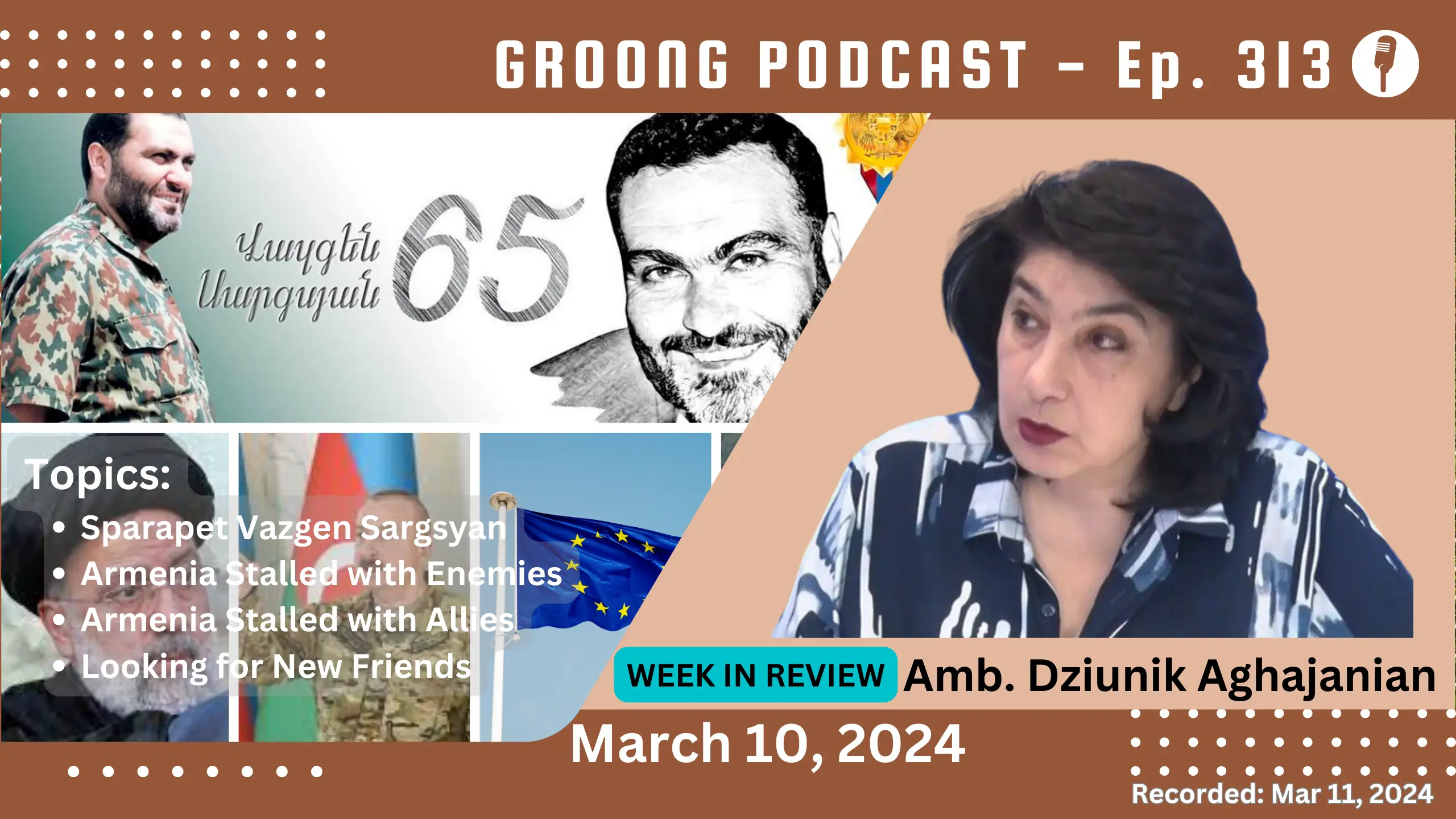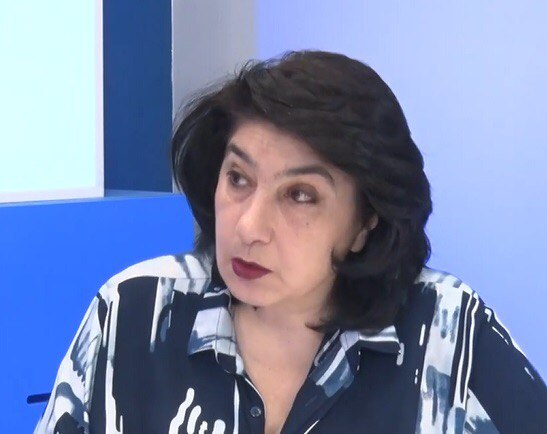Dziunik Aghajanian - Vazgen Sargsyan | Stalled With Enemies and Allies | Looking for New Friends | Ep 313 - Mar 10, 2024 [EP313]
Posted on Tuesday, Mar 12, 2024 | Category: Armenia, Artsakh, Corruption | Series: wir, video
Groong Links:
Guest:
Topics:
- Armenia Stalled
- Stalled with Enemies
- Stalled with Allies
- Economic Diversification
- Fish Rots from the Head
Episode 313 | Recorded: Mar 11, 2024
Show Notes
Topics This Week
Celebrating A Hero: Vazgen Sargsyan
This week was the birthday of Vazgen Sargsyan, the first Defense Minister of Armenia who also served as Prime Minister of Armenia until his assassination in 1999.
This was the 65th anniversary of the birth of the national hero, who is credited with building the Armenian army that was later responsible for the glorious victory in the first Artsakh war. He is referred to with the honorary title of “Sparapet”.
It is quite ironic that as prime minister, Pashinyan visits the gravesite of the sparapet every year for PR purposes. It is ironic on many grounds, not the least being that as a young “yellow” journalist, Pashinyan frequently wrote smear pieces criticizing Sargsyan.
So if before the 2020 war, the public perception of Pashinyan was that of being one of Vazgen Sargsyan’s biggest detractors, I wonder what is Pashinyan’s status vis-a-vis Sargsyan after 2020 and especially after 2023?
Questions:
- Dziunik, your thoughts?
Stalled with Enemies
Over the course of the past week, Ararat Mirzoyan confirmed that the Armenian-Azerbaijani foreign ministerial meetings in Munich two weeks ago recorded no progress. This means that Armenia’s relations with Turkey are also on pause as Turkish officials have repeatedly stated that any serious progress in Turkish-Armenian so-called “normalization” is dependent on meeting Azerbaijani demands.
So what are the Azerbaijani demands? In his interview with TRT, Ararat Mirzoyan spelled those out:
- He said that Azerbaijan refuses to recognize territorial integrity of Armenia based on Alma Ata, expressing concern that Azerbaijan has further ambitions against Armenia.
- He also said that Azerbaijan wants a third force to be stationed along the “corridors” through Armenia that they’re planning on using.
- Also, Mirzoyan said that Azerbaijan demands that Azerbaijanis can criss-cross Armenia to Nakhijevan without any passport, customs, or other related checks.
Meanwhile, in the past Armenia has suggested that a non-Armenian company be contracted to do the border control duties. Other Armenian officials have suggested that there could be “simplified procedures” for Azerbaijan, or that other creative technology solutions can be found to alleviate the concerns of Azeris from seeing Armenians on their ride through Armenia.
Mirzoyan, in his TRT interview also stated however, that no one can enter Armenia “without registration”.
Questions:
- So trying to put 2 and 2 together, am I right to understand that Armenia is trying to offer Azerbaijan a version of the “corridor” where Azerbaijanis can enter Armenia through some nominal registration system where they don’t ever see an Armenian? How is this supposed to work and what are the risks of such a system?
At the same time as Antalya was happening, the border commissions of the two countries also met apparently without any prior announcement and without any details released afterwards. This is in stark contrast to the previous meeting of Mher Grigoryan and Shahin Mustafayev at the end of January where the announcement of the meeting was made weeks ahead of time.
The only thing known about this meeting is from Shahin Mustafayev from the Azeri side, who immediately after that meeting said they demand unilateral concessions of territory even before the delimitation process starts and seemed to indicate that Armenia will concede to these demands.
Azerbaijan has blocked all avenues of progress, such as refusing to agree on maps to base border discussions on, yet saying that progress depends on determining a border, and refusing to return territories of over 31 villages it has occupied on sovereign Armenian territory since the 44-day war, claiming that they are “not occupying any Armenian territory.”
Questions:
- Why is Azerbaijan demanding unilateral concessions before delimitation has started?
- What is the significance of these “villages” for Azerbaijan?
- Are there indications that Armenian authorities are planning to concede to these demands?
Stalled with Allies
Given Armenia’s actions to pivot towards the west, its neighboring allies, Iran and Russia have given Pashinyan’s government increasingly strong warnings.
The Armenian and Iranian defense ministers met this past week, and Iran reiterated that extra-regional actors are not welcome in the South Caucasus. In fact, Iran itself has proposed in the past stationing monitors (to replace the EU monitors) on Armenia’s borders.
The Iran factor is very important and so besides Suren Papikyan over the past 2 weeks a large parade of Armenian officials has been in Iran, including:
Iranian officials have also been to Yerevan recently. Throughout all these meetings, the messaging has been repeated and consistent: don’t bring in outside forces to the region.
Questions:
- Meeting with your friends frequently is a good thing. But, something tells me that the frequency of Armenian visits to Iran is not entirely about close friendship. Your thoughts Dziunik?
Meanwhile, through foreign ministerial discussions between Mirzoyan and Lavrov, the Russian MFA has dangled both sticks and carrots, trying to get the Armenian government to stop and think harder.
Question:
- To all indications, these warnings are falling on deaf ears. We’re not seeing the Armenian government cooperate appreciably with either Russia or Iran. What’s the outlook in these relations going forward?
In Antalya, Lavrov and Bairamov reiterated that the November 2020 trilateral agreement is the appropriate basis for further negotiations.
Questions:
- What are your thoughts about the state of that agreement?
- How should Armenia respond to such an “invitation”?
- What can Russia contribute as a mediator between Armenia and Azerbaijan?
Azerbaijan is Arming
When we say that Azerbaijan has blocked all avenues of progress or when we use the word “stalled”, please don’t misinterpret it as a sign that Baku is pushing for or is satisfied with the current status quo. They’re actively arming themselves, as evident with more weapons flights from Bulgaria, Israel, and Turkey. Just last week, Azerbaijan held huge exercises in Nakhijevan.
New “Friends”?
In the interview with the TRT in Antalya, Mirzoyan said a few other things hinting at a U-turn in Armenia’s foreign policy. He said that Armenia is significantly deepening its relations with the EU and potential membership in the EU is also being discussed. This is against the backdrop of other moves Armenia has made, such as “freezing” its activity in the CSTO, threatening to leave the CSTO, and also inviting the Russians out of the Zvartnots airport, where the Russian border troops perform customs control duties.
In the past, Pashinyan has said that Armenia would develop its relations as closely to the EU as the latter deems possible. There were also unconfirmed reports this week in Armenian media that Pashinyan has met with the Civil Contract team and informed them that his government will submit an application to join the EU by the end of the year.
Question:
- Things are moving fast it seems. How likely do you think Armenia’s potential request to officially join the EU?
Armenia’s anti-CSTO gesturing apparently received some support this week, from the UK of all places. James Heappey, Minister of State (Ministry of Defence) (Minister for the Armed Forces), said the following about Armenia’s anti-CSTO moves:
_“The UK recognises this decision as Armenia's sovereign right and will work with Euro-Atlantic allies to support Armenia in the face of Russian threats of retaliation._
_The UK is a signatory of the OSCE arms embargo, and as such any benefits to UK defence industry must occur within the mandated restrictions. We will continue to work closely with Armenia to explore opportunities for closer cooperation.”_
EU and Western officials in the past have been nuanced in the past about not being able to provide security guarantees to Armenia and have tried not to directly encourage Armenia to leave the CSTO for this purpose.
Question:
- What has changed? Are western officials now openly encouraging Armenia to leave the CSTO or is Heappey’s statement an anomaly?
Wrap-up
That’s our Week in Review, we hope you found it helpful. We invite your feedback and your suggestions, you can find us on most social media and podcast platforms. Thanks to Laura Osborn for the music on our podcasts.
Guests

Dziunik Aghajanian
Ms. Dziunik Aghajanian has served Armenia through the ranks of the Ministry of Foreign Affairs, and most recently as a diplomat, as Armenia’s Ambassador to such countries as the Netherlands, Malaysia, and Indonesia. She received her education at Yerevan State University, Columbia University in NY, and Uppsala University in Sweden.
Hosts

Hovik Manucharyan
Hovik Manucharyan is an information security engineer who moved from Seattle to Armenia in 2022. He co-founded the ANN/Groong podcast in 2020 and has been a contributor to Groong News since the late 1990s.
Disclaimer: The views expressed by Hovik Manucharyan on the ANN/Groong podcast are his own and do not necessarily reflect the opinions of his employer or any other organization.

Asbed Bedrossian
Asbed Bedrossian is an IT professional, and for years oversaw the central IT enterprise infrastructure and services at USC. His decades of experience spanned across IT strategy, enterprise architecture, infrastructure, cybersecurity, enterprise applications, data center operations, high performance computing, ITSM, ITPM, and more.
Asbed founded the Armenian News Network Groong circa 1989/1990, and co-founded the ANN/Groong podcast in 2020.